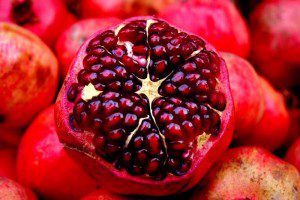Guest Writer for Wake Up World
The CDC estimates around 5.3 million Americans are living with some form of Alzheimer’s disease, and that number is expected to double by 2050.[1] Dementia, a generalized term used to describe neurodegeneration, is a disabling issue that have definitive roots in lifestyle and nutritional habits. While genetics may play a role in brain health, it’s lifestyle factors that are the driving force behind the progression of hereditary variables. A recent study is suggesting pomegranate, a red deciduous fruit rich in polyphenols, may be a potent protector against mental degeneration.
The Wonder Power of Pomegranate
One of the main factors in Alzheimer’s disease is the formation of amyloid plaque in the brain. This plaque divides irregularly and leads to beta amyloid, proteins that clump together and prevent proper cell-to-cell signaling. Certain metals – aluminum in particular – have been strongly implicated in the deposits of beta amyloid.[2] Research shows that exercise may reduce the extracellular accumulation of this plaque in the frontal cortex, possibly slowing or preventing the progression of Alzheimer’s and dementia.[3]
A recent study looking at the effects of freeze-dried pomegranate found the fruit inhibited the formation of these plaques as well as the swelling of irritation in the brain normally accompanying Alzheimer’s disease and dementia.[4] Pomegranate is a highly-concentrated source of antioxidants, and it’s this fact that may be one of the contributing factors to the fruit’s neuro-protective properties. Pomegranate extract may provide even more benefit than the whole fruit, since it’s much more concentrated.
How to Protect Your Brain
 Other than consuming pomegranate and small, antioxidant-rich berries, there are certain lifestyle habits you should adopt to protect the long-term health of your brain. As previously mentioned, exercise is essential for preventing amyloid plaque buildup. Getting enough sleep and managing blood sugar levels also appears to have beneficial effects on brain health. In fact, research shows Alzheimer’s disease is another type of diabetes, where the brain has a difficult time utilizing glucose for energy.[5] Reducing your grain and refined sugar carbohydrates could be helpful in this regard. Also, keeping your heart health in check may be helpful, as studies indicate atherosclerosis significantly raises dementia risk.[6]
Other than consuming pomegranate and small, antioxidant-rich berries, there are certain lifestyle habits you should adopt to protect the long-term health of your brain. As previously mentioned, exercise is essential for preventing amyloid plaque buildup. Getting enough sleep and managing blood sugar levels also appears to have beneficial effects on brain health. In fact, research shows Alzheimer’s disease is another type of diabetes, where the brain has a difficult time utilizing glucose for energy.[5] Reducing your grain and refined sugar carbohydrates could be helpful in this regard. Also, keeping your heart health in check may be helpful, as studies indicate atherosclerosis significantly raises dementia risk.[6]
What are you concerns with dementia? What steps have you taken to protect brain health?
– Dr. Edward F. Group III, DC, NP, DACBN, DCBCN, DABFM
Article Sources:
- Hebert LE, Scherr PA, Bienias JL, Bennett DA, Evans DA. Alzheimer disease in the US population: prevalence estimates using the 2000 census. Arch Neurol. 2003 Aug;60(8):1119-22.
- Exley C, House E, Polwart A, Esiri MM. Brain burdens of aluminum, iron, and copper and their relationships with amyloid-? pathology in 60 human brains. J Alzheimers Dis. 2012;31(4):725-730.
- Paul A. Adlard, Victoria M. Perreau, Viorela Pop, and Carl W. Cotman. Voluntary Exercise Decreases Amyloid Load in a Transgenic Model of Alzheimer’s Disease. The Journal of Neuroscience, 27 April 2005, 25(17): 4217-4221; doi: 10.1523/JNEUROSCI.0496-05.2005.
- Velagapudi R, Baco G, Khela S, Okorji U, Olajida O. Pomegranate inhibits neuroinflammation and amyloidogenesis in IL-1?-stimulated SK-N-SH cells. Eur J Nutr. 2015 Jul 10.
- Kaushik Shah, Shanal DeSilva, and Thomas Abbruscato. The Role of Glucose Transporters in Brain Disease: Diabetes and Alzheimer’s Disease. Int J Mol Sci. 2012; 13(10: 12629-12655. doi: 10.3390/ijms131012629.
- Silvestrini M, Viticchi G, Falsetti L, et al. The role of carotid atherosclerosis in Alzheimer’s disease progression. J Alzheimers Dis. 2011;25(4):719-26. doi: 10.3233/JAD-2011-101968.
Previous articles by Dr. Group:
- The 9 Best Fermented Foods for Your Gut
- 14 Foods that Cleanse the Liver
- How Turmeric Keeps You Looking Young
- 7 Toxins Harming Your Brain Right Now
- Top 5 Foods for the Pineal Gland
- 6 Things You Must Know About Colloidal Silver
- The Importance of a Kidney Cleansing Diet
- The 9 Best Herbs for Lung Cleansing and Respiratory Support
- 7 Best Foods to Support Kidney Function
- Lung Cleansing With Peppermint Oil
- 10 Best Herbs for Boosting Female Sex Drive
About the author:
 Dr. Edward F. Group III (DC, ND, DACBN, DCBCN, DABFM) founded Global Healing Center in 1998 and is currently the Chief Executive Officer. Heading up the research and development team, Dr. Group assumes a hands-on approach in producing new and advanced degenerative disease products and information.
Dr. Edward F. Group III (DC, ND, DACBN, DCBCN, DABFM) founded Global Healing Center in 1998 and is currently the Chief Executive Officer. Heading up the research and development team, Dr. Group assumes a hands-on approach in producing new and advanced degenerative disease products and information.
Dr. Group has studied natural healing methods for over 20 years and now teaches individuals and practitioners all around the world. He no longer sees patients but solely concentrates on spreading the word of health and wellness to the global community. Under his leadership, Global Healing Center, Inc. has earned recognition as one of the largest alternative, natural and organic health resources on the internet.
For more information, please visit Global Healing Center.

If you've ever found value in our articles, we'd greatly appreciate your support by purchasing Mindful Meditation Techniques for Kids - A Practical Guide for Adults to Empower Kids with the Gift of Inner Peace and Resilience for Life.
In the spirit of mindfulness, we encourage you to choose the paperback version. Delve into its pages away from screen glare and notifications, allowing yourself to fully immerse in the transformative practices within. The physical book enriches the learning process and serves as a tangible commitment to mindfulness, easily shared among family and friends.
Over the past few years, Wake Up World has faced significant online censorship, impacting our financial ability to stay online. Instead of soliciting donations, we're exploring win-win solutions with our readers to remain financially viable. Moving into book publishing, we hope to secure ongoing funds to continue our mission. With over 8,500 articles published in the past 13 years, we are committed to keeping our content free and accessible to everyone, without resorting to a paywall.







